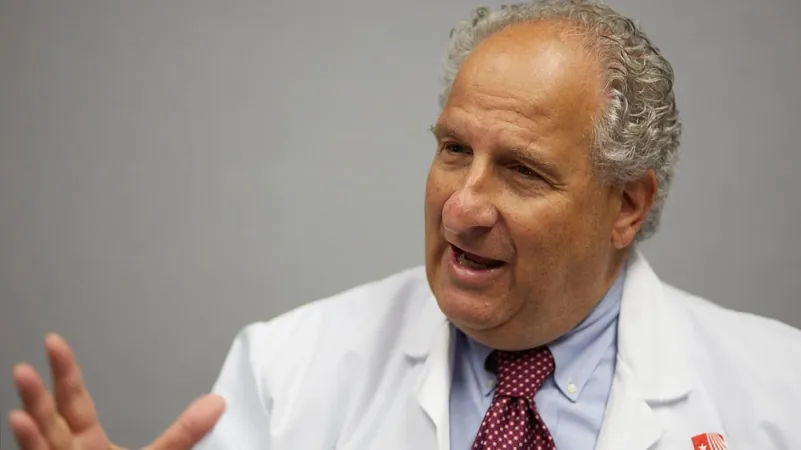
Shocking New Study Unveils Risks of Long COVID: Are You At Risk?
2025-01-15
Author: Ken Lee
Groundbreaking Study Unveils Critical Risk Factors
A groundbreaking new study from Stony Brook University has identified critical risk factors for developing long COVID, raising alarms for millions who have battled the virus.
The research found that individuals who experienced multiple infections or faced severe cases of COVID-19, especially those who were unvaccinated during their initial bout, are notably more susceptible to long-term health repercussions.
Study Overview and Findings
The study, which followed 2,522 participants who tested positive for COVID-19 between March 2020 and February 2024, revealed that 475 of them developed long COVID.
Alarmingly, 403 of those affected—almost 85%—had suffered from COVID-19 multiple times. This emphasizes the desperate need for public awareness regarding reinfections and vaccination.
Research Conducted at Stony Brook University
Conducted by experts at the Renaissance School of Medicine at Stony Brook University alongside the Stony Brook World Trade Center Health and Wellness Program, the study focused on essential workers, predominantly first responders who are routinely exposed to the virus.
Remarkably, these individuals were part of a healthcare program aimed at assisting those with health issues stemming from the September 11 terrorist attacks.
Key Associations Identified
The researchers discovered a “significant association” between the number of reinfections, severity of initial infections, and vaccination status at the time of infection.
They noted a concerning trend: a large percentage of unvaccinated participants experienced long COVID symptoms, amplifying the urgency for vaccination campaigns.
Expert Insights on Risk Factors
Lead author and Stony Brook professor Sean Clouston highlighted that factors like age and gender had minimal influence on long COVID risk unless they contributed to the severity of infections.
"It really wasn’t the age anymore; it was the COVID," Clouston remarked, pointing out that even younger individuals could experience severe COVID consequences leading to long-lasting symptoms.
Understanding Long COVID
Long COVID, also referred to as post-acute sequelae, manifests in various debilitating symptoms—ranging from cognitive fog and altered senses of taste and smell to chronic coughs and chest pain.
A diagnosis of long COVID typically applies to those who face lingering symptoms three months post-infection, which can last for a minimum of two months.
The Need for Ongoing Research
Experts stress that ongoing research into long COVID is crucial, as awareness grows regarding its risks, particularly now that severe cases and deaths from COVID-19 have declined significantly.
Dr. Reynold A. Panettieri Jr., Vice Chancellor of the Rutgers Institute for Translational Medicine and Science, remarked that the focus has now shifted to long COVID as the new threat, replacing the urgent fears of death or intensive care.
Vaccination and Long COVID Threats
Dr. Benjamin Luft, an infectious disease specialist involved in the study, cautioned that while vaccines have made a significant impact in reducing severe cases and fatalities, they do not prevent infections entirely.
"Long COVID-19 has been so debilitating and so harmful that we need effective solutions—whether that’s in the form of new vaccines or therapeutics," he stated, hinting at the need for innovative strategies and better vaccination options.
Call to Action for Vaccination Awareness
With vaccination rates tapering off since the pandemic's onset—despite a slight increase in 2024—health experts encourage the public to reconsider their reluctance toward vaccines and advocate for advancements in vaccine technology instead.
"Instead of dismissing the vaccine, we should be demanding better solutions that prevent infection altogether," Luft urged.
Conclusion: Assessing Your Risk
As we navigate the aftermath of COVID-19, understanding the risks associated with reinfection and the potential for long COVID becomes paramount.
Are you at risk? The time for awareness and action is now!



 Brasil (PT)
Brasil (PT)
 Canada (EN)
Canada (EN)
 Chile (ES)
Chile (ES)
 Česko (CS)
Česko (CS)
 대한민국 (KO)
대한민국 (KO)
 España (ES)
España (ES)
 France (FR)
France (FR)
 Hong Kong (EN)
Hong Kong (EN)
 Italia (IT)
Italia (IT)
 日本 (JA)
日本 (JA)
 Magyarország (HU)
Magyarország (HU)
 Norge (NO)
Norge (NO)
 Polska (PL)
Polska (PL)
 Schweiz (DE)
Schweiz (DE)
 Singapore (EN)
Singapore (EN)
 Sverige (SV)
Sverige (SV)
 Suomi (FI)
Suomi (FI)
 Türkiye (TR)
Türkiye (TR)